One of my morning rituals is to go through my daily Google Alerts email that I receive everyday. In addition to following all of my portfolio companies, I have also set alerts for keywords in the psychedelic industry.
“Magic mushrooms,” “psilocybin,” and “psychedelics,” are just a few of the words I receive news articles about. This allows me to not only keep up with the trends of the industry, but more importantly, I educate myself on everything there is to know about psychedelics.
On a typical day, I receive about a dozen different articles about psychedelics. Generally, they fall into two categories:
- Some kid gets pulled over in middle America and then thrown in jail for possession of psychedelic mushrooms.
- A US military veteran finally gets real treatment for their PTSD by using psychedelic medicine.
This morning, I saw an article that really caught my attention. “Man found with 120 grams of ‘magic mushrooms’ facing life in jail.”
Life in jail!? Woah. That sounds extreme. The US must really be going insane.
Oh, wait. That article is about a 19-year-old ‘man’ in Australia. Hmmm…
Don’t you think that it’s ABSOLUTELY INSANE that the world has adopted policies to throw people in jail, FOR LIFE, for possessing the SAME EXACT substance that is effectively treating people better than any current pharmaceutical drug on the market?!
I’ll say it again, in a shorter sentence:
We’re ruining people’s lives for using harmless things that are saving their own life.
Of course, the age-old argument is that street drugs are the gateway to worse things… worse things like alcohol! Seriously… The Global Commission on Drug Policy released their report of psychoactive substances and guess what ranks as the number one most harmful substance for individuals and to society? Alcohol.
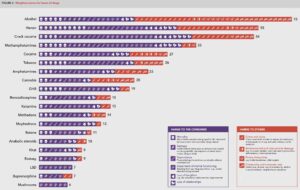
The report, which is appropriately subtitled, “When Science Was Left Behind,” shows why our global classification of drugs has nothing to do with logic. A monkey throwing darts at a wall could have picked a more accurate drug scheduling system.
Strangely, much of our global society has just accepted this bizarre system that dictates what we’re allowed, and not allowed, to put into our bodies. Now, don’t get me wrong, I’m not suggesting we just let the flood gates open and legalize all drugs.
Wait, actually that would be the best solution. Not only would it save thousands of lives from insane drug wars, but it would bring the proper medications to the people most in need. Want some crazy facts about the war on drugs?:
- The US has spent over $1 TRILLION dollars on ongoing drug wars since the 1970’.
- In Mexico alone there have been over 100,000 people killed in the past decade because of the on-going drug war there.
- The US spends over $10 million dollars per day to incarcerate people charged with drug-related offenses.
- The US had a budget of nearly $30 billion for drug control.
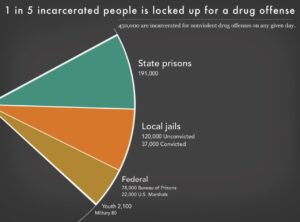
Source: Prison Policy
Ok, you get it. The drug war is ineffective and it’s not the solution to what we’re trying to accomplish. The only thing getting accomplished is agreements with major defense contractors and punishing people in the most ineffective way imaginable – locking them up in a cage.
And that is one of my big points here. How many drug addicts do you know? One or two? Maybe a family member? I don’t care who you are, or where you’re from, we all know someone who is currently struggling with a drug addiction or has had a history with excessive drug consumption.
Now, answer this honestly: Why are those people taking drugs in the first place? Do you think it’s because they simply enjoy the activity? Absolutely not. People who addictively consume drugs are doing so because they are trying to escape something.
That might be a childhood trauma, mental illness, or even PTSD from an event such as war or domestic abuse. Drug abuse is not to pursue the feeling of what drugs provide, it’s to escape the feeling which drugs can help go away.
The real problem isn’t drugs. The real problem is the type of drugs that we have access to.
Take opioids for example. “The total population of the United States makes up less than 5% of the world’s total population, yet Americans consume 80% of all opioids produced in the world.” In this situation, we have a crisis in over-prescription of a certain drug that is being used as a fix-all.
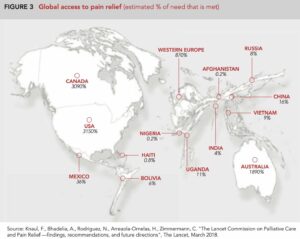
Although access to pain relief is disproportionally high in the US and Canada, the problem is with the type of pain relief, not the availability.
In the US, drug overdoses are the leading cause of death in adults under 50, with over 50,000 deaths attributed to opioid overdoses in 2017 alone. Clearly, people are searching for some kind of relief. Whether that relief is for actual physical pain, or in many cases mental pain, neither are being effectively treated.
That’s all about to change.
In the past couple of years, dozens of studies are showing that psychedelics are effective in treating PTSD, anxiety, depression, addiction, and numerous other mental ailments. Even more amazing is that many of these studies are showing that psychedelics aren’t simple band-aids. Instead, these treatments can have long lasting positive effects – sometimes permanent.
These are not random studies going unnoticed. Recently, the U.S. Defense Advanced Research Projects Agency (DARPA) announced a study in partnership with the University of North Carolina School of Medicine. DARPA has agreed to fund over $26 million for research of psychedelics, such as ketamine and psilocybin, for mental health medications.
Meanwhile, over in Oregon, activists behind an initiative to legalize psilocybin mushrooms for therapeutic purposes announced on Monday (June 29, 2020) that they have secured more than enough valid signatures to qualify for the November ballot. If this initiative were to pass, the pathway to a broader legalization trend could track very similarly to the cannabis industry.
Even the Trump appointed Creating Options for Veterans Expedited Recovery (COVER) Commission has chimed in on the topic. In a recent report the Commission recommended that the VA should “engage with other federal agencies, as appropriate, to research the potential short- and long-term risks, as well as benefits, of medical cannabis and psychedelic drugs.”
Business insights and data provider, CB Insights, has also identified psychedelic medicines as a Game Changer for 2020. Specifically, they have identified three companies, one of which is public and you can invest in right now: MindMed.
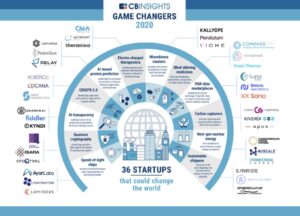
Investors are taking notice of this huge opportunity as well. Because of COVID-19, there has been a renewed interest in biotech, with the first quarter of 2020 seeing over $6 billion of funding. Meanwhile, most other industries have seen record declines in funding.
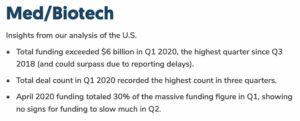
Source: Crunchbase
In the public markets, over a dozen psychedelic companies have listed on public stock exchanges and there are over a dozen more currently seeking public listings. Additionally, many private companies are now opening up funding rounds as investors start to turn their interest to mental health biotech startups.
For investors, private companies in the psychedelic industry present an extremely compelling opportunity, which is why I have already invested in several. I’m currently speaking with dozens of companies and plan on investing in many more. You can join me in these deals, if you are an accredited investor, HERE.
If you’re not an accredited investor, or you prefer to participate in the public markets, then you can go to Psychedelic Invest to view the world’s first psychedelic index that includes companies across multiple international stock exchanges. Here is what the dashboard looks like:

Psychedelic Invest is a completely free resource you can use to look at publicly traded psychedelic companies with over 20 companies currently listed.
With renewed interest in funding medical biotech companies and an extremely early industry just now opening up to investors, psychedelics will be very exciting. Investors are already starting to see massive returns, and more importantly, people are now getting access to medicines that actually work.




